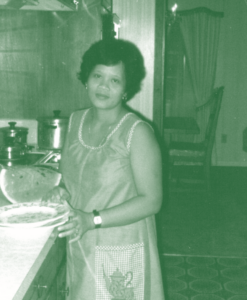In the photograph, Aunt Anna looks back at Lysa who snaps the camera. It’s 1978, at Aunt Helen’s house in Waterproof, Louisiana, during the annual summer reunion. All fifty members of the Howell clan camping out, drinking and eating for two weeks. Anna wears a light-weight, blue-jean dress with red and white check trim, and a pocket made of the same material, on which Aunt Helen had sewn a tea kettle. Anna leans, ever so slightly, on the counter with her fingers spread, palm down, pressed against two or three plates on the counter. She feigns annoyance, but then at the last minute, just before the snap, half smiles. Behind the plates, just to the back of Aunt Anna’s left arm is the watermelon. The size of Anna’s head, fleshy and burnt pink, like the color of Lysa’s thighs after lying on the levies all afternoon. Stomach down, straps down, back open to the wet Louisiana sun, body cool on the hazy teal grass.

In the photo, Aunt Anna wears a watch that Uncle Bill gave her as well as a large diamond ring that can’t be seen. The watch was a birthday present after years of marriage, whereas the diamond ring was a gift just after their engagement in Vietnam. Lysa always said the ring was a down-payment for their marriage, Anna’s moving back to the states, and nursing him into old age. But, after all, she’d managed to make a life for herself here, she’d even opened up a restaurant, Anna’s Kitchen over in Natchez, a small Vietnamese diner serving southern comfort food.
When Uncle Bill died in the early eighties he left behind his small oil fortune. Anna got most of it, and was also in charge of divvying it up: their kids Billy and Rebecca split half the money, while Anna got the other half. Lysa and the other cousins got polished stone necklaces or ivory bracelets or guns; Bill’s living brothers and sisters got a sapphire or diamond or ruby; his children in Argentina, Iran, and Cote d’Ivoire got solid gold bars, which they came immediately to retrieve without so much as a thank you. Aunt Helen said Anna hid most of the money in the restaurant so as the kids couldn’t get to it, cause if they did, they’d drink or drug it all away. Then, just like that, twenty or so years after Bill’s death, the restaurant burned to the ground overnight, struck by lightning. An act of God that sent Anna back to Vietnam, as if the past forty years hadn’t happened.
The photograph is mostly unremarkable, but when Lysa pulled it from a family album that’d been sitting in Aunt Helen’s attic for at least twenty years, she’d become obsessed. It sat by her bed at night and on her desk during the day. She’d look at it with a screwed-up face, like someone trying to remember something they’d never been told. Finally she took it to Aunt Helen at the nursing home, and asked, what’s the watermelon story? Helen paused before answering, then asked for her stash of whiskey, which Lysa promptly found and poured for them both. She looked deeply sad, and said, “it’s like this:
You can’t live a life you’ve already lived again, you only have one, and whatever decisions you make, they happen for the whole family sometimes, sometimes they don’t. Mama Howell, my mother, your grandmother, had a watermelon patch, a watermelon garden if you will. The first year she grew was 1911. Well, that year, the Mississippi broke every levy and flooded every town but ours, and that’s how we got the name Waterproof. Some people said it was the watermelon that did the trick. The patch was so big, it sucked up all the underground water that the river didn’t swell up over the levies like in other places. Instead, it went underground and fed the watermelons. On account of her Baptist superstition, Mama Howell grew that watermelon patch every year, just in case it really was the watermelons that saved us. So, every year Mama lived, the patch grew and grew, and we ate watermelon like it was going outta fashion. Every summer, there’d be watermelon after watermelon on the counter with a knife right in the middle, so as anyone who was passing through and wanted some could take it. Those years were golden. The family was happy, without pain. The country wasn’t at war, the brothers were all home. Then Mama Howell died. Then Bill died, then Roland, then Curly. Anna replanted the watermelon patch for almost twenty years after, but then she got tired of the work, and that died too. The first year she didn’t plant, the town flooded. That’s when your Uncle Buddy and I moved outta Mama Howell’s old house, the family house for nearly a century, and into something smaller and farther out from the river. Tika, my daughter, started a watermelon patch again, but the floods kept coming.”
